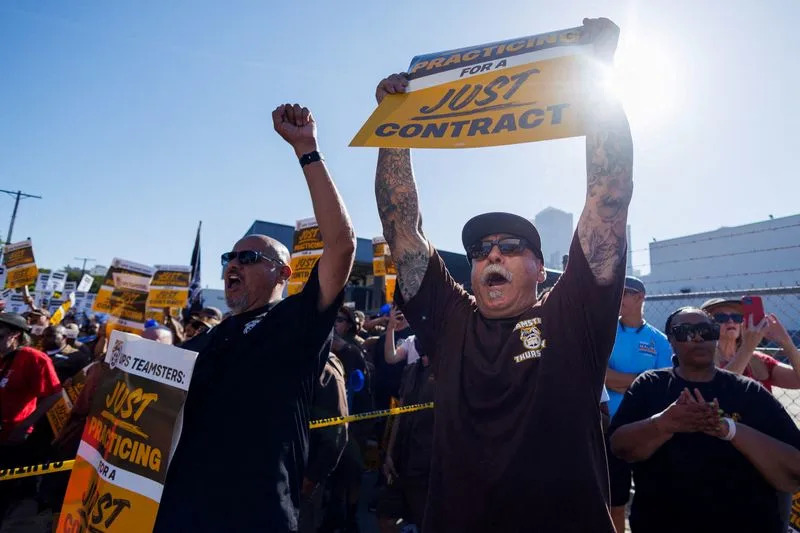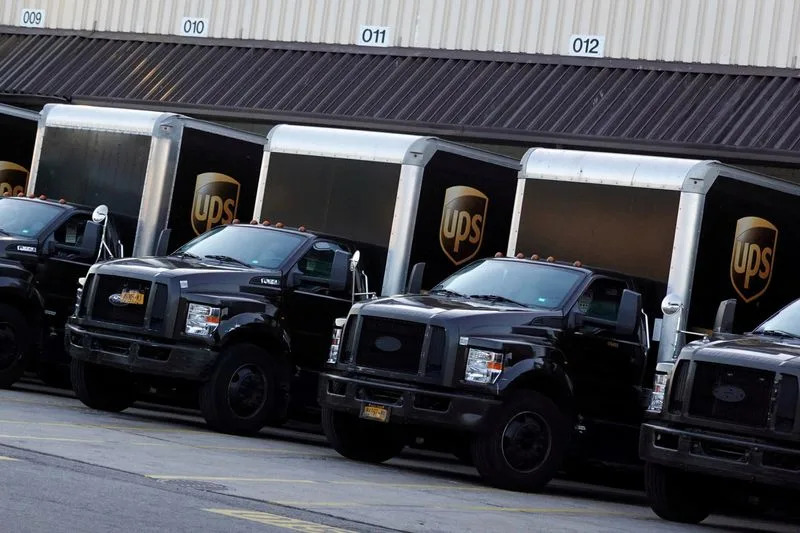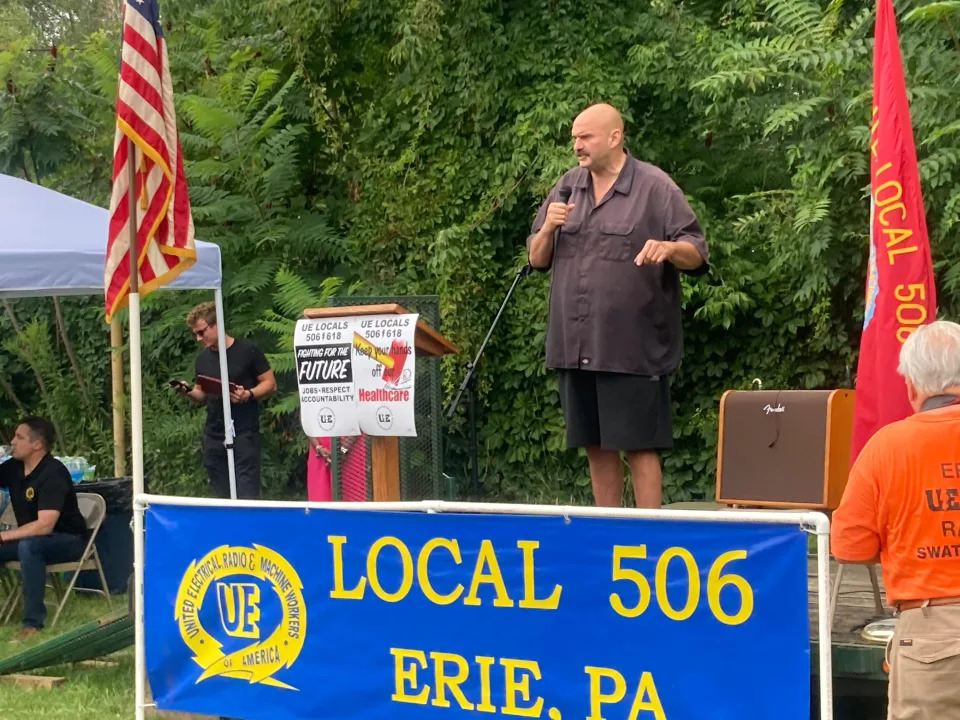5 wins for UPS workers that could influence pay and standards for others
Lauren Kaori Gurley, (c) 2023, The Washington Post
Sun, August 20, 2023
After a tense few months of negotiations and the looming possibility of a strike that threatened the U.S. economy, UPS and the International Brotherhood of Teamsters, the union that represents UPS workers reached a tentative agreement on a new contract, which sets pay and work standards at UPS for the next five years.
The deal, which the Teamsters have said will cost UPS $30 billion to implement, includes major gains for workers from the creation of thousands of new full-time positions to the end of forced overtime on scheduled days off. Teamsters President Sean O'Brien has said it "sets a new standard in the labor movement and raises the bar for all workers." Carol Tomé, UPS's chief executive, also has also praised the deal, saying that it "continues to reward UPS's full- and part-time employees with industry-leading pay and benefits."
Those workers who have spoken publicly about the new deal have expressed a mix of reactions, positive and negative. On Aug. 22, the union will announce that result of workers' vote on whether to ratify the deal. If workers vote down the contract, labor leaders have said that the union would go on strike.
Despite pockets of strong opposition, it's likely that the agreement will pass a vote from workers, as 161 out of 162 local Teamsters unions, who have significant sway over their membership, endorsed the agreement, and union leadership is busy selling the deal to workers.
The UPS contract is important, labor experts say, because it has the potential to influence what other workers around the country, both union and nonunion, are able to get from their employers in the future.
"If you can show that workers at other companies . . . are getting something, it helps your argument to get the same thing," said Art Wheaton, the director of labor studies at Cornell University. "A rising tide lifts all boats."
Here are five key wins in the deal that UPS workers are voting on that could shape the future of work in America:
- - -
1. Big raises
All 340,000 UPS employees represented by the union, including part-timers, would see healthy pay raises, including an across-the-board $7.50 an hour increase over the next five years. It's an important gain, because, until recently, wages in the United States had not kept up with inflation. The top rate for full-time delivery drivers would jump to $49 an hour. Currently, full-time drivers make an average of $42 an hour after four years on the job.
Teamsters leader O'Brien has said that they hope the union can use the gains in the contract to inspire nonunion workers to unionize - in particular at Amazon, the country's second largest employer, which has opposed internal organizing efforts. The average pay for Amazon delivery drivers, who are third-party contractors, is roughly $18 an hour, according to the jobs site ZipRecruiter. (Amazon founder Jeff Bezos owns The Washington Post. Interim chief executive Patty Stonesifer sits on Amazon's board.)
The biggest pay bumps, by percentage, though, will go to part-time UPS employees, who make up more than half of UPS's 340,000 union workforce and sort packages into warehouses. Under the new contract, part-timers will receive longevity increases, the same raises as delivery drivers, and their minimum pay would immediately jump to $21 an hour, and rise to $23 an hour over the next five years. (Currently part-timers start at $16.20 an hour.)
With this and other gains, Teamsters say current part-timers will receive an average total wage increase of 48 percent over the next five years, a pay bump that labor experts say that would have been unthinkable several years ago, when workers had less leverage in the labor market.
Still, some Teamsters members had hoped for a starting wage of $25 an hour for part-timers - given the soaring cost of rent in cities like New York and Los Angeles, where many of these workers live. A vocal group of workers within the union says that they'll oppose the contract for this reason.
- - -
2. Air conditioning and heat safety
Currently, the signature brown vans that UPS delivery drivers operate are not outfitted with air-conditioning. In one of the biggest concessions that will cost the company billions of dollars, UPS has agreed to install air-conditioning in newly purchased delivery vans beginning in 2024, while also retrofitting older vans with heat shields and fans.
More than 140 UPS employees have been injured in heat- or dehydration-related incidents since 2015, according to data reported to the federal government by UPS. And last year, a 24-year-old UPS delivery driver in Southern California died on his route on a scorching summer day.
Heat safety is not isolated to UPS delivery drivers - and this win could inspire other workers to demand similar protections. This summer has seen some of the Earth's hottest days on record. And most U.S. workers who toil in the heat - from roofers to farmworkers - have few legal protections from extreme heat on the job.
- - -
3. Ending of lower-paid class of worker
In a major win for workers, UPS has also agreed to end a two-tier wage program for its delivery drivers - first established in 2018 - which resulted in some delivery drivers earning about $5 per hour less over time than other drivers for doing essentially the same job.
Two-tier employment that undercuts pay and benefits for newer workers has become a common feature of many workplaces since the 1980s, as companies have pushed to cut costs. These systems sow resentment inside workplaces by rewarding employees differently for the same job.
The UPS agreement to abolish two-tier pay for package delivery drivers could embolden other workers to demand the same. Already, the United Auto Workers, the union representing workers at the Big Three Detroit automakers - Ford, General Motors and Stellantis - is demanding the end of its tiered employment structure that offers lower compensation to many new autoworkers. The union with its 150,000 members has threatened to strike over this and other issues as soon as mid-September.
"UPS is not a director competitor of the auto industry, but the autoworkers union can go ask for what UPS workers got in their contract and say, 'This is what other unionized workplaces have received in the same economic environment,'" said Wheaton, the labor professor at Cornell University.
- - -
4. Thousands of new full-time jobs
In another win for part-timers, UPS has also promised to create 7,500 full-time positions by combining 15,000 part-time jobs. The creation of full-time jobs is important because part-timers are only guaranteed three-and-a-half hour shifts and many would prefer full-time work.
It's the largest number of full-time jobs that workers have won in decades, although less than the 10,000 jobs won when UPS workers went on strike in 1997.
Research shows that part-time workers earn less per hour worked than other workers in the same industry and face less schedule predictability.
- - -
5. Ban on driver-facing cameras
In a victory against the seep of surveillance technology into the American workplace, UPS drivers won a landmark agreement for UPS to eliminate driver-facing cameras installed in delivery vans and promise not to discipline drivers using other cameras in vans. Amazon delivery drivers currently are subject to discipline from similar surveillance cameras in their vans.
Also, UPS and the union have also agreed to contract language that prevents UPS from using driverless vehicles or drones without negotiating with the union.
Across the country, workers are using their unions to fight back against the use of new technologies that they say invade their privacy, threaten their jobs and punish them. The demand for guardrails on the use of artificial intelligence by production studios is one of the principal demands for actors and screenwriters in ongoing strikes that have paralyzed Hollywood.














